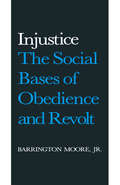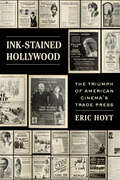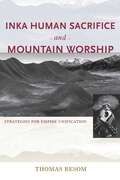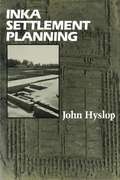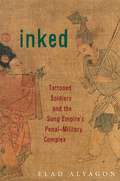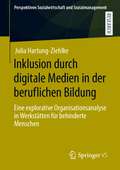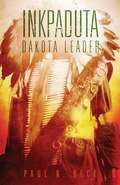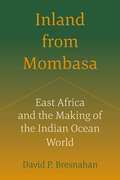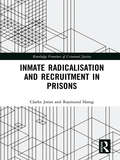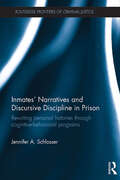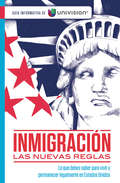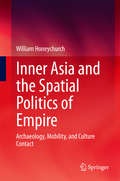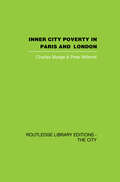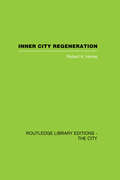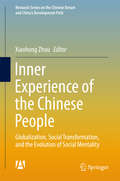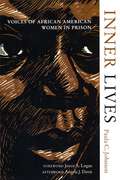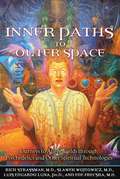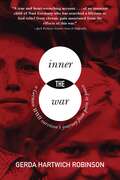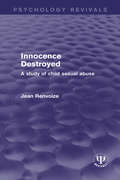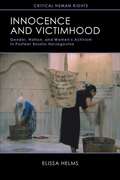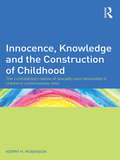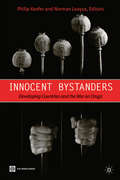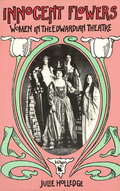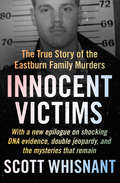- Table View
- List View
Injustice: The Social Bases of Obedience and Revolt
by Barrington Moore, JrFirst Published in 1978. Routledge is an imprint of Taylor & Francis, an Informa company.
Ink-Stained Hollywood: The Triumph of American Cinema’s Trade Press
by Eric HoytA free open access ebook is available upon publication. Learn more at www.luminosoa.org. For the first half of the twentieth century, no American industry boasted a more motley and prolific trade press than the movie business—a cutthroat landscape that set the stage for battle by ink. In 1930, Martin Quigley, publisher of Exhibitors Herald, conspired with Hollywood studios to eliminate all competing trade papers, yet this attempt and each one thereafter collapsed. Exploring the communities of exhibitors and creative workers that constituted key subscribers, Ink-Stained Hollywood tells the story of how a heterogeneous trade press triumphed by appealing to the foundational aspects of industry culture—taste, vanity, partisanship, and exclusivity. In captivating detail, Eric Hoyt chronicles the histories of well-known trade papers (Variety, Motion Picture Herald) alongside important yet forgotten publications (Film Spectator, Film Mercury, and Camera!), and challenges the canon of film periodicals, offering new interpretative frameworks for understanding print journalism’s relationship with the motion picture industry and its continued impact on creative industries today.
Inka Human Sacrifice and Mountain Worship: Strategies for Empire Unification
by Thomas BesomThe Inka empire was the largest pre-Columbian polity in the New World. Its vast expanse, its ethnic diversity, and the fact that the empire may have been consolidated in less than a century have prompted much scholarly interest in its creation. In this study, Besom explores the ritual practices of human sacrifice and the worship of mountains, attested in both archaeological investigations and ethnohistorical sources, as tools in the establishment and preservation of political power.Besom examines the relationship between symbols, ideology, ritual, and power to demonstrate how the Cuzqueños could have used rituals to manipulate common Andean symbols to uphold their authority over subjugated peoples. He considers ethnohistoric accounts of the categories of human sacrifice to gain insights into related rituals and motives, and reviews the ethnohistoric evidence of mountain worship to predict locations as well as motives. He also analyzes specific archaeological sites and assemblages, theorizing that they were the locations of sacrifices designed to assimilate subject peoples, bind conquered lands to the state, and/or justify the extraction of local resources.
Inka Settlement Planning
by John HyslopBefore the Spanish conquest in the sixteenth century A.D., the Inka Empire stretched along the Pacific side of South America, all the way from Ecuador to northwest Argentina. Though today many Inka researchers focus on the imperial capital of Cuzco, Peru, and surrounding areas, ruins of Inka settlements abound throughout the vast territory of the former empire and offer many clues about how the empire was organized, managed, and defended. These outlying settlements, as well as those in the Cuzco area, form the basis for John Hyslop's detailed study Inka Settlement Planning.<P><P>Using extensive aerial photography and detailed site maps, Hyslop studies the design of several dozen settlements spread throughout the empire. In addition to describing their architecture and physical infrastructure, he gives special emphasis to the symbolic aspects of each site's design. Hyslop speculates that the settlement plans incorporate much iconography expressive of Inka ideas about the state, the cosmos, and relationships to non-Inka peoples—iconography perhaps only partially related to the activities that took place within the sites. And he argues that Inka planning concepts applied not only to buildings but also to natural features (stone outcrops, water sources, and horizons) and specialized landscaping (terracing).
Inked: Tattooed Soldiers and the Song Empire’s Penal-Military Complex (Harvard East Asian Monographs)
by Elad AlyagonInked is a social history of common soldiers of the Song Dynasty, most of whom would have been recognized by their tattooed bodies. Overlooked in the historical record, tattoos were an indelible aspect of the Song world, and their ubiquity was tied to the rise of the penal–military complex, a vast system for social control, warfare, and labor.Although much has been written about the institutional, strategic, and political aspects of the history of the Song and its military, this book is a first-of-its-kind investigation into the lives of the people who fought for the state. Elad Alyagon examines the army as a meeting place between marginalized social groups and elites. In the process, he shows the military to be a space where a new criminalized lower class was molded in a constant struggle between common soldiers and the agents of the Song state. For the millions of people caught in the orbit of this system—the tattooed soldiers, their families, and their neighbors—the Song period was no age of benevolence, but one of servitude, violence, and resistance. Inked is their story.
Inklusion durch digitale Medien in der beruflichen Bildung: Eine explorative Organisationsanalyse in Werkstätten für behinderte Menschen (Perspektiven Sozialwirtschaft und Sozialmanagement)
by Julia Hartung-ZiehlkeBei der Implementierung digitaler Bildungsangebote spielt die Lebenswelt der Werkstatt für behinderte Menschen (WfbM) mit ihrem Selbstentwurf als „Familie“ sowie als Schutz- und Lebensraum eine entscheidende Rolle. Julia Hartung-Ziehlke betrachtet in diesem Buch die Organisationsform der WfbM vor dem Hintergrund der Implementierung digitaler Bildungsangebote. Sie prüft, wie sich die Situation, die formale Struktur sowie die Kultur der Organisation auf das Verhalten der Organisationsmitglieder und deren Einstellung gegenüber digitalen Bildungsprozessen auswirken und welche organisationalen Konzepte dabei eine wesentliche Rolle spielen. Für die Implementierungspraxis digitaler Bildungsangebote in der WfbM empfiehlt die Autorin die Implementierung eines neuen Beziehungsmodells.
Inkpaduta: Dakota Leader
by Paul Norman BeckAs a child in Minnesota, Beck (history, Wisconsin Lutheran College) learned that Inkpaduta, who died about 1879, was a madman whose only passion was murdering white settlers. As a scholar, he learned that Dakotas of Inkpaduta's time and his own consider him a leader who refused to sell his tribal lands and fought to protect them, a loving father, and a man who could act recklessly at times but mostly remained at peace with whites, and who just wanted to live in traditional ways. He tells as much of the leader's life as he can find evidence for. Annotation ©2008 Book News, Inc., Portland, OR (booknews.com)
Inland from Mombasa: East Africa and the Making of the Indian Ocean World
by David P. BresnahanA free ebook version of this title is available through Luminos, University of California Press's Open Access publishing program. Visit www.luminosoa.org to learn more. Over the past few decades, scholars have traced how Indian Ocean merchants forged transregional networks into a world of global connections. East Africa's crucial role in this Indian Ocean world has primarily been understood through the influence of coastal trading centers like Mombasa. In Inland from Mombasa, David P. Bresnahan looks anew at this Swahili port city from the vantage point of the communities that lived on its rural edges. By reconstructing the deep history of these Mijikenda-speaking societies over the past two millennia, he shows how profoundly they influenced global trade even as they rejected many of the cosmopolitan practices that historians have claimed are critical to creating global connections, choosing smaller communities over urbanism, local ritual practices over Islam, and inland trade over maritime commerce. Inland from Mombasa makes the compelling case that the seemingly isolating alternative social pursuits engaged in by Mijikenda speakers were in fact key to their active role in global commerce and politics.
Inmate Radicalisation and Recruitment in Prisons (Routledge Frontiers of Criminal Justice)
by Clarke Jones Raymund E NaragIt is traditionally viewed that vulnerable inmates form captive audiences for violent terrorist offenders who, in turn, are destined to turn prisons into training grounds for militant activities; all the while forming alliances with more hardened criminals to produce an even greater threat. However, there is limited empirical grounding to underpin these assertions. Inmate Radicalisation and Recruitment in Prisons challenges existing perceptions about prison radicalisation. Whilst not downplaying the seriousness of the prison radicalisation threat, it seeks a more balanced interpretation of current discussion. Drawing on original research in the Philippines and case studies from Australia, the US, Canada, Indonesia, the UK, France, the Netherlands, and Belgium, the authors posit an alternative view that suggests that the imprisonment of a terrorist may mark the beginning of physical disengagement and psychological de-radicalisation. Offering evidence-based insights to help determine how best to house terrorist offenders, this volume will appeal to students and researchers interested in fields such as Criminology and Criminal Justice, Terrorism, Prisons, and Organised Crime.
Inmates' Narratives and Discursive Discipline in Prison: Rewriting personal histories through cognitive behavioral programs (Routledge Frontiers of Criminal Justice)
by Jennifer A SchlosserThe question of ‘what works’ in offender treatment has dominated the field of prisoner re-entry and recidivism research for the last thirty years. One of the primary ways the criminal justice system tries to reduce the rates of recidivism among offenders is through the use of cognitive behavioural programs (CBP) as in-prison intervention strategies. The emphasis for these programs is on the idea that inmates are in prison because they made poor choices and bad decisions. Inmates’ thinking is characterized as flawed and the purpose of the program is to teach them to think and act in socially appropriate ways so they will be less inclined to return to prison after their release.This book delves into the heart of one such cognitive behavioural programme, examines its inner workings, its effects on inmates’ narrated experience and considers what happens when a CBP of substandard quality and integrity is used as a gateway for inmates’ release. Based on original empirical research, this book provides realistic suggestions for improving policy, for reforming current in-prison programs engaging in problematic practices and for instituting alternatives that take the needs of the inmates into greater account. This book is essential reading for students and academics engaged in the study of sociology, criminal justice, prisons, social policy, sentencing and punishment.
Inmigración. Las nuevas reglas. Guía de Univision
by UnivisiónTodo lo que un inmigrante debe conocer para vivir legalmente en Estados Unidos Inmigrar a Estados Unidos tiene nuevas reglas: Un gobierno que quiere imponer leyes más estrictas, amenaza de deportación, falsa información, estafas, miedo. Todo ha complicado la situación del inmigrante. Por eso Univision te brinda los recursos y los consejos para que puedas enfrentar la nueva realidad que estamos viviendo. En esta guía, los expertos en inmigración de Univision, el abogado Armando A. Olmedo y el editor principal de inmigración Jorge Cancino, te explican claramente varios aspectos que todo inmigrante debe saber: o Cómo funciona el proceso migratorio de Estados Unidos o Las principales visas para entrar al país de visita o para trabajar o Qué es asilo y refugio y quiénes pueden acogerse a ellos o Cómo obtener la residencia o Cómo convertirte en ciudadano americano o Legal o ilegal: Qué debes hacer ante la nueva realidad o Cuáles son tus deberes y derechos como inmigrante Con un texto informativo, claras ilustraciones, datos precisos y casos reales, Inmigración, las nuevas reglas es la guía de Univision que te acompañará en tu proceso de inmigración, desde que dejas tu tierra hasta que vives el sueño americano.
Inner Asia and the Spatial Politics of Empire
by William HoneychurchThis monograph uses the latest archaeological results from Mongolia and the surrounding areas of Inner Asia to propose a novel understanding of nomadic statehood, political economy, and the nature of interaction with ancient China. In contrast to the common view of the Eurasian steppe as a dependent periphery of Old World centers, this work views Inner Asia as a locus of enormous influence on neighboring civilizations, primarily through the development and transmission of diverse organizational models, technologies, and socio-political traditions. This work explores the spatial management of political relationships within the pastoral nomadic setting during the first millennium BCE and argues that a culture of mobility, horse-based transport, and long-distance networking promoted a unique variant of statehood. Although states of the eastern steppe were geographically large and hierarchical, these polities also relied on techniques of distributed authority, multiple centers, flexible structures, and ceremonialism to accommodate a largely mobile and dispersed populace. This expertise in "spatial politics" set the stage early on for the expansionistic success of later Asian empires under the Mongols and Manchus. Inner Asia and the Spatial Politics of Empire brings a distinctly anthropological treatment to the prehistory of Mongolia and is the first major work to explore key issues in the archaeology of eastern Eurasia using a comparative framework. The monograph adds significantly to anthropological theory on interaction between states and outlying regions, the emergence of secondary complexity, and the growth of imperial traditions. Based on this approach, the window of Inner Asian prehistory offers a novel opportunity to investigate the varied ways that complex societies grow and the processes articulating adjacent societies in networks of mutual transformation.
Inner City Poverty in Paris and London
by Charles Madge Peter WillmottBoth the great cities studied in this book are renowned for their imposing streets and buildings, their cultural and political vitality and their cosmopolitan lifestyles, but just outside their centres are neighbourhoods where ordinairy people have their homes, often living in poverty and sometimes in squalor. Two such neighbourhoods were Stockwell in London and Folie-Mericourt in Paris, and are the tale of this 'tale of two cities' told by social researchers. The local studies are set in their broader metropolitan and national contexts, including an examination of changes over time in income patterns in France and Britain and in housing policies in the metropolitan regions. This illuminates the effects of different social policies adopted by Britain and France, Paris and London, to help poor and disadvantaged families. This book was first published in 1981.
Inner City Regeneration
by Robert K. HomeThis book covers all the main aspects of government policy and practice in British inner city regeneration. Chapters deal with the development of policy, agencies for regeneration, housing, social issues. The UK edxperience is compared with that of other countries, particularly the USA, and past achievements and future prospects are considered. This book was first published in 1982.
Inner Experience of the Chinese People
by Xiaohong ZhouThis book comprehensively explores the changes in the Chinese spiritual world from the perspective of transition and transformation. Chinese feeling, a brand-new concept corresponding to Chinese experience, refers to the vicissitudes that 1. 3 billion Chinese people have been through in their spiritual worlds. The book discusses this concept together with Chinese experience, two aspects of the transformation of the Chinese mentality that resulted from the unprecedented social changes since 1978, and which have given this unique era historical meaning and cultural values. At the same time they offer a dual perspective for understanding this great social transition. Further, the book considers what will happen if we only focus on the "Chinese Experience" while neglecting the "Chinese Feeling"; the changes the Chinese people undergo when their desires, wishes and personalities have changed China; and how their emotionally charged social mentality follow eb bs and flows of the changing society. Lastly it asks what embarrassment and frustration the population will be faced with next after the tribulations their spiritual world has already been through.
Inner Lives: Voices of African American Women In Prison
by Paula JohnsonAn intimate collection of African American women's voices on their lives in prisonThe rate of women entering prison has increased nearly 400 percent since 1980, with African American women constituting the largest percentage of this population. However, despite their extremely disproportional representation in correctional institutions, little attention has been paid to their experiences within the criminal justice system.Inner Lives provides readers the rare opportunity to intimately connect with African American women prisoners. By presenting the women's stories in their own voices, Paula C. Johnson captures the reality of those who are in the system, and those who are working to help them. Johnson offers a nuanced and compelling portrait of this fastest-growing prison population by blending legal history, ethnography, sociology, and criminology. These striking and vivid narratives are accompanied by equally compelling arguments by Johnson on how to reform our nation's laws and social policies, in order to eradicate existing inequalities. Her thorough and insightful analysis of the historical and legal background of contemporary criminal law doctrine, sentencing theories, and correctional policies sets the stage for understanding the current system.
Inner Paths to Outer Space: Journeys to Alien Worlds through Psychedelics and Other Spiritual Technologies
by Rick Strassman Ede Frecska Luis Eduardo Luna Slawek WojtowiczAn investigation into experiences of other realms of existence and contact with otherworldly beings • Examines how contact with alien life-forms can be obtained through the “inner space” dimensions of our minds • Presents evidence that other worlds experienced through consciousness-altering technologies are often as real as those perceived with our five senses • Correlates science fiction’s imaginal realms with psychedelic research For thousands of years, voyagers of inner space--spiritual seekers, shamans, and psychoactive drug users--have returned from their inner imaginal travels reporting encounters with alien intelligences. Inner Paths to Outer Space presents an innovative examination of how we can reach these other dimensions of existence and contact otherworldly beings. Based on their more than 60 combined years of research into the function of the brain, the authors reveal how psychoactive substances such as DMT allow the brain to bypass our five basic senses to unlock a multidimensional realm of existence where otherworldly communication occurs. They contend that our centuries-old search for alien life-forms has been misdirected and that the alien worlds reflected in visionary science fiction actually mirror the inner space world of our minds. The authors show that these “alien” worlds encountered through altered states of human awareness, either through the use of psychedelics or other methods, possess a sense of reality as great as, or greater than, those of the ordinary awareness perceived by our five senses.
Inner War: A German WWII Survivor’s Journey from Pain to Peace
by Gerda RobinsonIt is sometimes difficult to remember that in war there are innocents on all sides who suffer. German citizens who had no connection to the atrocities committed by their countrymen nonetheless endured great hardships because of them. In The Inner War, author Gerda Hartwich Robinson narrates her story as a German survivor of World War II. She tells how her life’s journey included hunger, fear, neglect, and physical and emotional abuse, and how she carried these injustices in her mind and body for many years, leading to debilitating back pain, headaches, panic attacks, depression, and feelings of inadequacy. In this touching memoir, Robinson shows that the tragedies of war don’t end when the last bomb is dropped or the last prisoner freed; they continue in subtle but devastating ways. Like many German citizens during and after the war, Robinson was simply trying to survive a terrifying situation she had nothing to do with. She describes how her spirit was devastated by hopelessness, and how she entertained thoughts of suicide. The Inner War shares lessons she learned at a chronic pain rehabilitation center that allowed her to start on a path to peace and love.
Innocence Destroyed: A Study of Child Sexual Abuse (Psychology Revivals)
by Jean RenvoizeHow common is child sexual abuse? How can victims and abusers best be treated? In Innocence Destroyed, originally published in 1993, Jean Renvoize uses interviews with victims and with experienced professionals, as well as new data from Britain, North America and Australia, to give a clear picture of the problem of child sexual abuse – its extent, its effects, and the most up-to-date recommendations for treating its victims and preventing its recurrence at the time. For those new to the subject, her book provides a readable account of a complex area, and for the more experienced worker it gives as invaluable overview of the findings of other professionals in the field.
Innocence and Victimhood
by Elissa HelmsThe 1992-95 war in Bosnia-Herzegovina following the dissolution of socialist Yugoslavia became notorious for "ethnic cleansing" and mass rapes targeting the Bosniac (Bosnian Muslim) population. Postwar social and political processes have continued to be dominated by competing nationalisms representing Bosniacs, Serbs, and Croats, as well as those supporting a multiethnic Bosnian state, in which narratives of victimhood take center stage, often in gendered form. Elissa Helms shows that in the aftermath of the war, initiatives by and for Bosnian women perpetuated and complicated dominant images of women as victims and peacemakers in a conflict and political system led by men. In a sober corrective to such accounts, she offers a critical look at the politics of women's activism and gendered nationalism in a postwar and postsocialist society. Drawing on ethnographic research spanning fifteen years, "Innocence and Victimhood" demonstrates how women's activists and NGOs responded to, challenged, and often reinforced essentialist images in affirmative ways, utilizing the moral purity associated with the position of victimhood to bolster social claims, shape political visions, pursue foreign funding, and wage campaigns for postwar justice. Deeply sensitive to the suffering at the heart of Bosnian women's (and men's) wartime experiences, this book also reveals the limitations to strategies that emphasize innocence and victimhood.
Innocence, Knowledge and the Construction of Childhood: The contradictory nature of sexuality and censorship in children’s contemporary lives
by Kerry H. RobinsonInnocence, Knowledge and the Construction of Childhood provides a critical examination of the way we regulate children’s access to certain knowledge and explores how this regulation contributes to the construction of childhood, to children’s vulnerability and to the constitution of the ‘good’ future citizen in developed countries. Through this controversial analysis, Kerry H. Robinson critically engages with the relationships between childhood, sexuality, innocence, moral panic, censorship and notions of citizenship. This book highlights how the strict regulation of children’s knowledge, often in the name of protection or in the child’s best interest, can ironically, increase children’s prejudice around difference, increase their vulnerability to exploitation and abuse, and undermine their abilities to become competent adolescents and adults. Within her work Robinson draws upon empirical research to: provide an overview of the regulation and governance of children’s access to ‘difficult knowledge’, particularly knowledge of sexuality explore and develop Foucault’s work on the relationship between childhood and sexuality identify the impact of these discourses on adults’ understanding of childhood, and the tension that exists between their own perceptions of sexual knowledge, and the perceptions of children reconceptualise children’s education around sexuality. Innocence, Knowledge and the Construction of Childhood is essential reading for both undergraduate and postgraduate students undertaking courses in education, particularly with a focus on early childhood or primary teaching, as well as in other disciplines such as sociology, gender and sexuality studies, and cultural studies.
Innocent Bystanders: Developing Countries and the War on Drugs
by Norman Loayza Philip KeeferThe drug policies of wealthy consuming countries emphasize criminalization, interdiction, and eradication. Such extreme responses to social challenges risk unintended, costly consequences. The evidence presented in this volume is that these consequences are high in the case of current drug policies, particularly for poor transit and producer countries. These costs include the deaths of thousands in the conflict between drug cartels and security forces, political instability, and the infiltration of criminal elements into governments, on the one hand; and increased narcotics use in countries that would not otherwise have been targeted by drug suppliers. Despite such costs, extreme policies could be worthwhile if their benefits were significantly higher than those of more moderate, less costly policies. The authors review the evidence on the benefits of current policies and find that they are clouded in uncertainty: eradication appears to have no permanent effect on supply; the evidence on criminalization does not exclude either the possibility that its effects on drug consumption are low, or that they are high. Uncertainty over benefits and the high costs of current policies relative to alternatives justifies greater emphasis on lower cost policies and more conscientious and better-funded efforts to assess the benefits of all policies.
Innocent Flowers: Women in the Edwardian Theatre
by Julie HolledgeThe Edwardian actress, glamorous and privileged, was the sex symbol of her time. Yet her life was a paradox: off stage she could marry, divorce and take lovers with impugnity; on stage she had to play dutiful wives or daughters or 'scarlet women'. Thousands of these spirited women set out to change the conventional roles they played - and to change the world. Some of them were famous - Athene Seyler, Kitty Marion, Elizabeth Robins, Edy Craig, many others unknown. Managing their own companies, they put on hundreds of plays all over the country - many on taboo subjects such as divorce, sex, venereal disease, prostitution - by little known playwrights as well as established dramatists like Shaw, Ibsen, Barrie. They took the establishment theatre by storm; and they made their mark on the political stage too, forming the Actresses' Franchise League and joining the battle for the vote. Innocent Flowers tells the story of these astonishing women (and includes some of their plays). By tracing their lives and loves, Julie Holledge has rediscovered an inspiring period in the history of women and the theatre.
Innocent Flowers: Women in the Edwardian Theatre
by Julie HolledgeThe Edwardian actress, glamorous and privileged, was the sex symbol of her time. Yet her life was a paradox: off stage she could marry, divorce and take lovers with impugnity; on stage she had to play dutiful wives or daughters or 'scarlet women'. Thousands of these spirited women set out to change the conventional roles they played - and to change the world. Some of them were famous - Athene Seyler, Kitty Marion, Elizabeth Robins, Edy Craig, many others unknown. Managing their own companies, they put on hundreds of plays all over the country - many on taboo subjects such as divorce, sex, venereal disease, prostitution - by little known playwrights as well as established dramatists like Shaw, Ibsen, Barrie. They took the establishment theatre by storm; and they made their mark on the political stage too, forming the Actresses' Franchise League and joining the battle for the vote. Innocent Flowers tells the story of these astonishing women (and includes some of their plays). By tracing their lives and loves, Julie Holledge has rediscovered an inspiring period in the history of women and the theatre.
Innocent Victims: The True Story of the Eastburn Family Murders
by Scott WhisnantThe riveting true account of a grisly crime and the unprecedented three murder trials faced by Fort Bragg soldier Tim Hennis. On Mother&’s Day, 1985, the bodies of Kathryn Eastburn and her two young daughters were found in their Fayetteville, North Carolina, home. Katie, an air force captain&’s wife, had been raped and stabbed to death. Kara and Erin&’s throats had been slit. Their toddler sister, Jana, was the only survivor of a bloody killing spree that terrified a community still reeling from the conviction, six years prior, of Dr. Jeffrey MacDonald for the savage slayings of his pregnant wife and two daughters. The Cumberland County Sheriff&’s Department soon focused its investigation on US Army soldier Tim Hennis. Detectives and local prosecutors built their case on circumstantial evidence and a jury convicted Hennis and sentenced him to death. But his defense team refused to give up. Piece by piece, they discredited the state&’s case, exposing false testimony, concealed evidence, and prosecutorial misconduct. At a second trial, Hennis was found not guilty and released from death row. But an even more stunning turn of events was yet to come. Twenty-five years after the murders, the North Carolina State Bureau of Investigation tested a crucial piece of DNA evidence from the crime scene. The shocking results led to an unprecedented third trial to determine Tim Hennis&’s guilt or innocence. From the initial discovery of the horrifying scene at 367 Summer Hill Road to the controversial change of jurisdiction that allowed Hennis to be prosecuted for an astonishing third time, author Scott Whisnant chronicles every development in this intricate, disturbing, and still-evolving case. Has the mystery of who killed Katie, Kara, and Erin Eastburn been solved beyond a reasonable doubt? Read Innocent Victims and decide for yourself.
